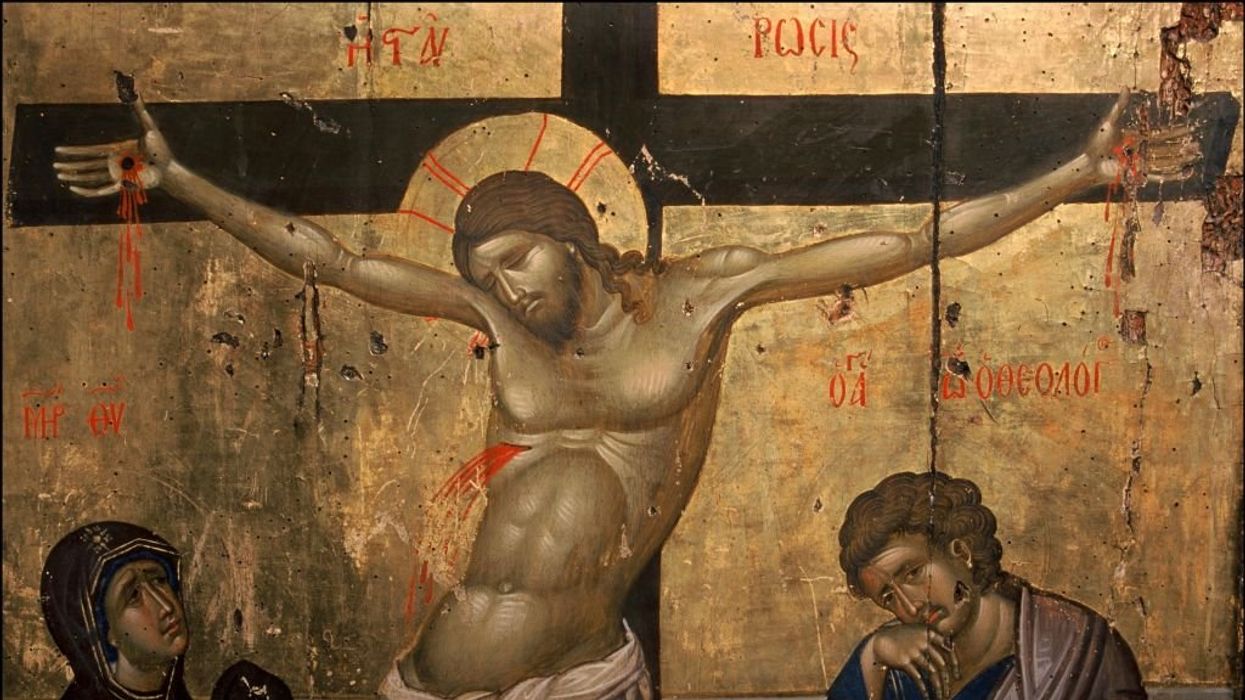
Getty Images/Patrick Aventurier

The reordering of earthly affairs is no substitute for the reordering of our hearts.
Right now, we Orthodox are still in the midst of Lent. Of the Lenten fast, much can be said. At a time this year when so many of us face incessant demands to blast off into the future or return to the distant past, Lent demands we inhabit and accept the present. Our present discomforts open on to the reality that the experience of God now requires our suffering now.
The pangs of hunger, of the loss of the analgesic distraction that food and drink can provide even when hunger is far away – these things are only the initial forms of self-denial and repentance that blossom fully in the heart, where we encounter God through suffering in our heart on behalf of the world.
Both the political and the spiritual demand humility and discernment.
In this experience, we come to know our heart is truly the temple of the Lord, akin to a church or monastery, made for the same purpose, to bring us into union with God.
This process, which can and often does consume an entire life and “lifestyle,” may be taken up with spiritual athleticism and asceticism that pushes the mind, soul, and body to the utmost limit. Like athletes training and testing themselves and one another, Orthodox are encouraged to push themselves: The limits of holy self-stripping and the surrender of comforts, passions, pleasures, and even the senses can only be found in the greatest love — to lay down one’s life for others as a sacrifice on their behalf.
At the same time, Orthodox are reminded of the great danger — the great spiritual danger — in pushing oneself too hard, too far, too fast. Pride, as well as a host of other sins born of temptation and delusion, is always there beckoning us to take on more than is proper for us given our degree of spiritual strength and development. Little do the demons revel in more than a Christian discovering with horror that he or she has suffered a seemingly irreversible act of self-sabotage. Such moments can tempt even the deeply faithful to abandon all hope and all discipline with it.
This lesson applies with great import to Lent itself. Taking on too strict a fast is a recipe for sin, delusion, confusion, failure, and despair — often even more so than taking on too lenient a fast.
Falling short through weakness or ineptitude is painful enough but never a surprise, and the remedy is always clear and always the same: self-condemnation, repentance, prayer for forgiveness and mercy, and a resumption of the spiritual struggle. Falling short through pride makes the climb back through the reliable remedy greatly more challenging, more painful, and more difficult to trust.
It invites the still more grievous harm of the strange vainglory that is judging oneself unworthy of the mercy of God — a judgment that belongs to God alone — or even preemptively rejecting the forgiveness of God, an error that, at the truly diabolical height of its intensity, can be tantamount to the unforgivable sin of blaspheming the Holy Spirit.
To avoid these nightmarish outcomes, there is but one path to take, that of humility. Without the discipline of humility, there is no possibility of acquiring careful discernment as to one’s level of spiritual strength or weakness.
The acquisition of such discernment may be aided or supplemented by reading and contemplating spiritual texts, but even the very best of these can never substitute for the development of one’s own spiritual experience. Humility is, in this sense, not at all an abstract virtue or ideal, approached by recalling past examples or imagining future accomplishments but an experience now, year by year, day by day, moment by moment, rise upon fall, fall upon rise.
This is the spiritual battle heightened and clarified by the Lenten fast, which should extend beyond food and drink to encompass all the things, visible and invisible, which we fashion into an earthly den of false and fleeting comfort.
This includes politics, especially distracting now, in what we rightly sense is a moment of crisis for our country and our society. It's tempting to retreat from our present discomfort and seek solace in either the faintly recollected past or in a future beyond imagination. Frantic acceleration — whether "forward" or "back" — into abrupt, wholesale transformation seems preferable to remaining in this unbearable tension.
But the reordering of earthly affairs is no substitute for the reordering of our hearts. In training our attention on our internal, spiritual disarray, the Lenten season confronts us with the most urgent source of our pain: the woefully inadequate abode we have prepared for the King of All.
Our shame and wounded pride can lead us to spiritual extremes as well. Here, as with the penitent in the midst of Lent, humble discernment is key, allowing us to determine and accept the degree of intensity we are capable of withstanding and using as it is intended, toward the healing of body and soul.
In short, we must pray to God as we are now. We must pray like the Publican, that we might be received by Him — back into our own hearts, so to speak — like the father received his prodigal son.
It is here that we will find the only true salvation: the eternal union with God made possible to us in grace by the God-man Christ.
James Poulos
BlazeTV Host